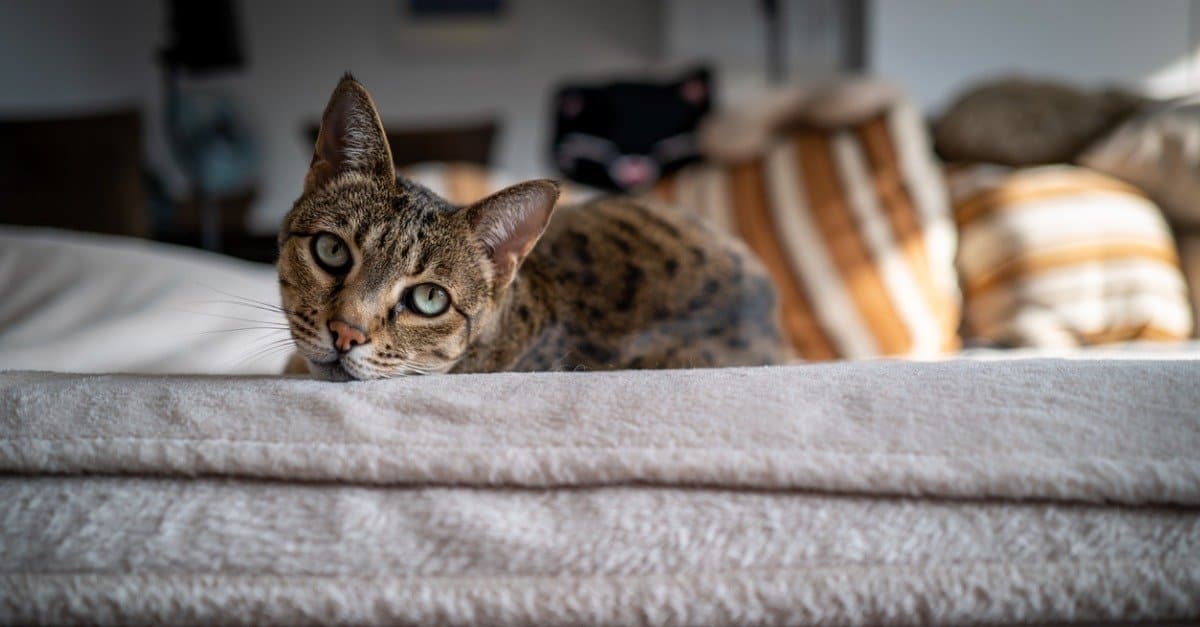Cats lead unique lives and their curiosity seems endless. They are full of personality, whether shy, spontaneous, playful, or enigmatic. Sometimes, though, their quirkiness produces unwanted results. One of their undesirable habits that needs immediate correcting is when they are urinating on your bed. If you’re asking yourself, “Why is my cat peeing on my bed?” here are the top reasons and how to stop them.
1. Litter Box Problems
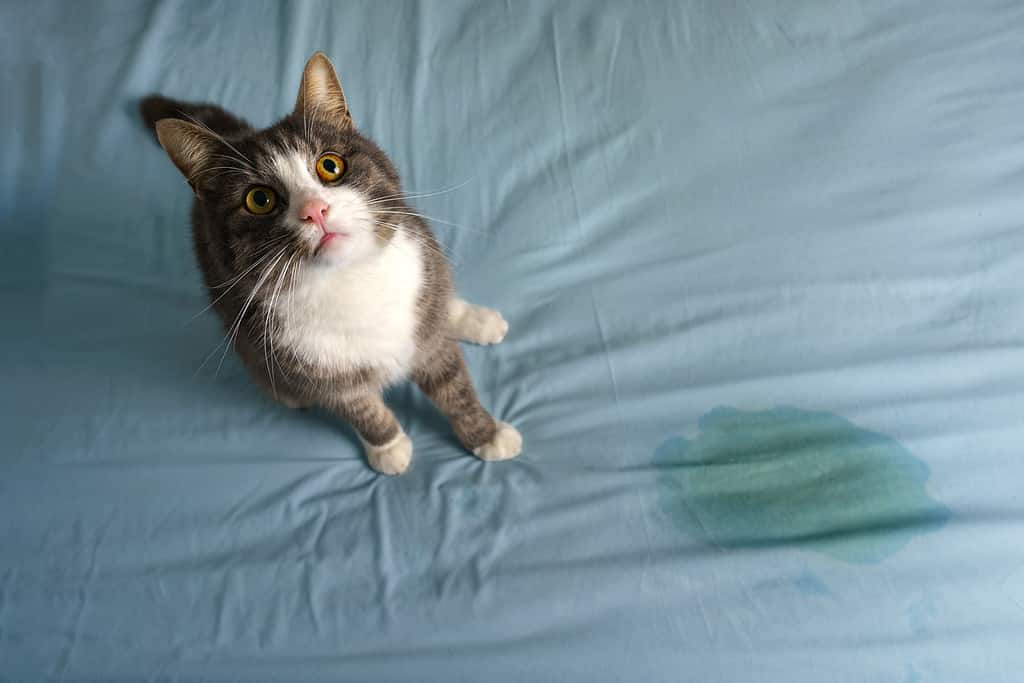
Litter box problems are a common cause of your cat peeing in your bed.
©Daria Kulkova/iStock / Getty Images Plus via Getty Images
Not Enough Litter Boxes
You need at least one litter box for each cat in your household, and the Humane Society of the United States recommends putting out an additional litter box beyond that quota. Why? Some cats will not urinate and defecate in the same box. Spread the litter boxes in different areas of the household, preferably somewhere comfortable and quiet. If your home is multilevel, make sure that you have litter boxes on all of them. As well, kittens need multiple boxes because their bladders lack the full control that adult cats possess.
Litter Box Location
When we as humans want to use the restroom, we want a quiet and comfortable area. So do our furry friends! If your litter box is in a public or heavily traveled area of your house, move it somewhere more private. As well, move your litter box if it sits near a noisy area such as a regularly used appliance or a furnace that randomly makes a loud noise.
Cats possess great eye vision; they can see six to eight times better than humans in the dark. However, make sure the box is in an area with at least a little lighting. Moreover, don’t place the box somewhere the cat may feel threatened, such as in a closet or where a dog must pass by to get to his food.
Also, consider your cat’s age. Cats become less mobile in older age, and what may have been comfortable and/or accessible no longer meets your cat’s needs. Finally, even though this is common sense, make sure that the litter box is far from your cat’s food and water.
Type of Litter Box
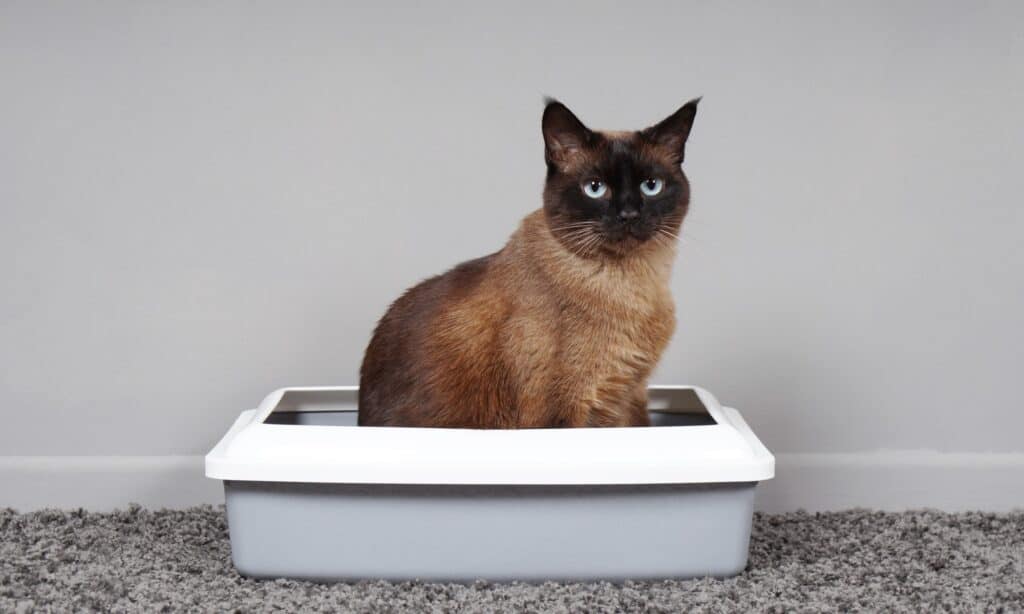
Pick a litter box that suits your cat’s physical and emotional needs.
©iStock.com/Axel Bueckert
Retailers offer many types of boxes from which to choose: automatic, hooded pan, open pan, disposable, enclosed, top entry, and corner pan. While having multiple choices is nice, keep your cat’s temperament in mind. Some of these boxes constrict movement, so be sure to pick one where your cat can get in a comfortable position. As well, cats may find a covered box too dark or its smell too strong.
Size is also an important consideration. A kitten needs a smaller box, but all cats need boxes they can enter and exit easily. Make sure the sides are not too high to provide accessibility for your cat. For a larger cat, give it a box where it has room to shuffle around.
Type of Litter
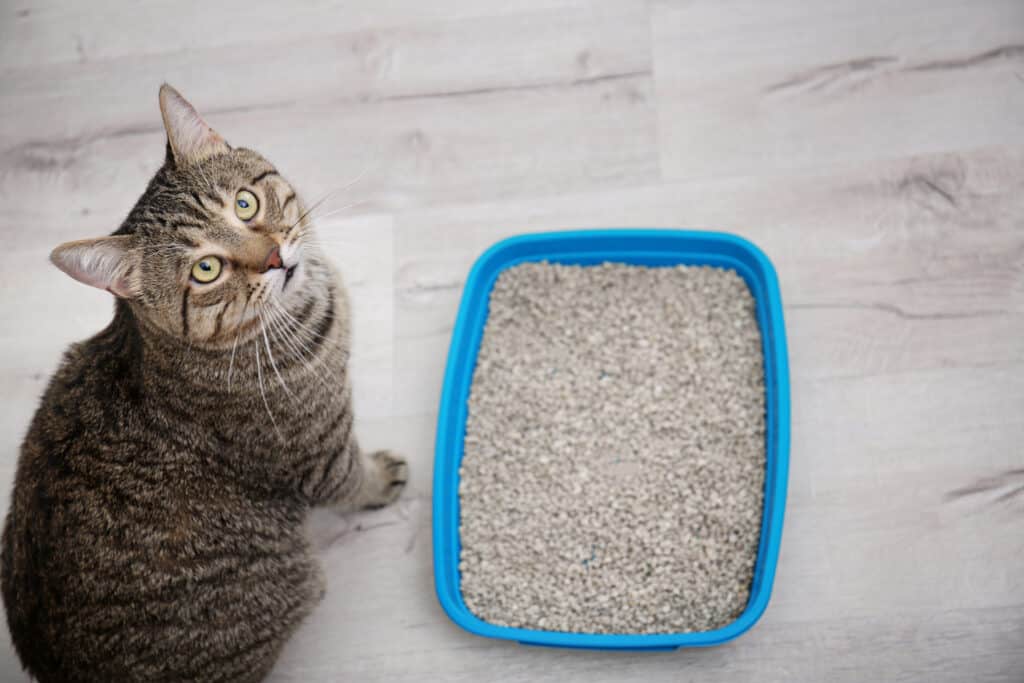
Let your cats choose what litter they like best.
©New Africa/Shutterstock.com
Many types of litter exist, so you need to find one with which your cat feels comfortable. A relatively easy way to give your cat some choice is to buy a small size of two or three different brands. Pick one that is softer and one with harder pellets, and then let your cat pick which one it prefers. If your cat has been declawed, it will probably choose a softer litter.
Cats who spend a great deal of time outdoors may prefer a little soil mixed into their litter. Clay litter may not work with longer-haired cats because it can get stuck in their fur. Many cats may prefer crystal litter or pine; however, some cats may need a litter with no fragrance at all. Just make sure that the litter is absorbent because cats instinctively bury their urine and feces to elude predators.
Experiment with the litter’s depth to find the perfect landing ground for your feline. Your cat may prefer anywhere from 1-4 inches of litter, but discerning that sweet spot is a matter of trial and error.
It should go without saying, but change out the litter, and clean the litter box often. Most experts recommend changing out the litter every 2-3 weeks, but you (and your cat) may find that switching it out more often is preferable. As well, litter liners provide quick and easier clean-up. Either way, be sure to regularly clean the box itself every week or so.
Getting a hand on litter problems may keep your cat from peeing in your bed!
2. Medical Problems
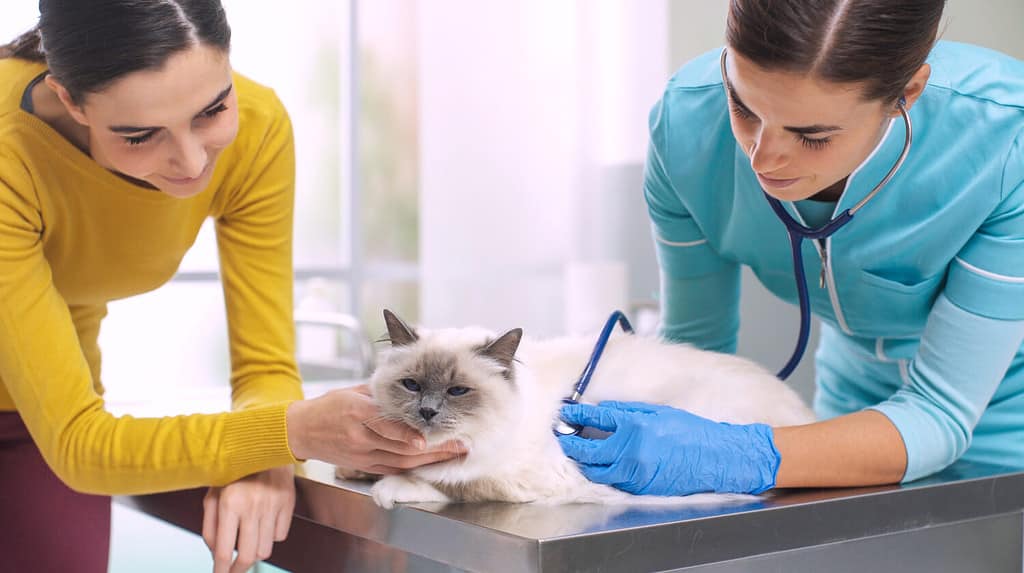
Some reasons your cat might be peeing in your bed are due to health issues.
©Stock-Asso/Shutterstock.com
Your cat may possess an undiagnosed health issue that is causing it to pee in your bed or other places beyond the litter box. Your vet will be able to provide insight into these issues including bladder stones or a bladder infection. Diabetes and kidney disease are other possible reasons your cat might be urinating in undesirable spaces.
3. Stress

Emotional stress may be the reason your cat is peeing in your bed.
©Benevolente82/Shutterstock.com
Cats possess a wide range of emotions: They feel sad, happy, anxious, bored, and depressed, just like humans. Pinpointing the source of your cat’s stress can be key in discovering why your cat is peeing in your bed.
Not Enough Exercise
Bored cats and those with extra energy may develop anxiety and stress. First of all, cats need a minimum of one hour a day for their physical and mental health. If possible, let your cat roam around outdoors freely. Additionally, cat toys such as balls, wand toys, a cat wheel, a scratching post, or an indoor agility course provide your feline with that much-needed physical outlet.
Insecurity

Make your cat feel confident by spending quality time with them.
©PeopleImages/iStock via Getty Images
Your cat may be peeing on your bed due to feelings of insecurity. This insecurity could be caused by many reasons such as separation anxiety or a change in routine. If your cat suddenly begins peeing in your bed, consider any variations that have occurred in your household lately.
If pet owners have started a new job or increased their hours away from home, separation anxiety may be the cause of the unwanted behavior. Be sure to give your cat extra one-on-one playtime, and if possible, make any changes as gradually as you can.
Major changes such as moving, bringing a baby home, or introducing a new pet to the family can make your cat anxious and/or jealous. Giving a cat more “high places” to perch on such as a cat tree or condo will build confidence. Again, major changes can be stressful for everyone in the household, so be sure to carve out extra time with your cat to reassure him/her of your devotion and love.
Negative Reinforcement
Disciplining your cat negatively can certainly be a cause of your cat peeing in your bed. Placing or holding your cat in its litter box to attempt to get them to use it will create a negative association with the box. Cats abhor negative reinforcement; it only causes resentment. Let them know that the box is there, but don’t force them into it. As well, never rub your cat’s nose in its urine after it has peed in your bed. She won’t understand the association which will cause additional anxiety. Any negative reinforcement will likely backfire because it will cause insecurity which will, in turn, lessen your cat’s trust in you and jeopardize your relationship.
4. Not Spaying/Neutering Your Cat
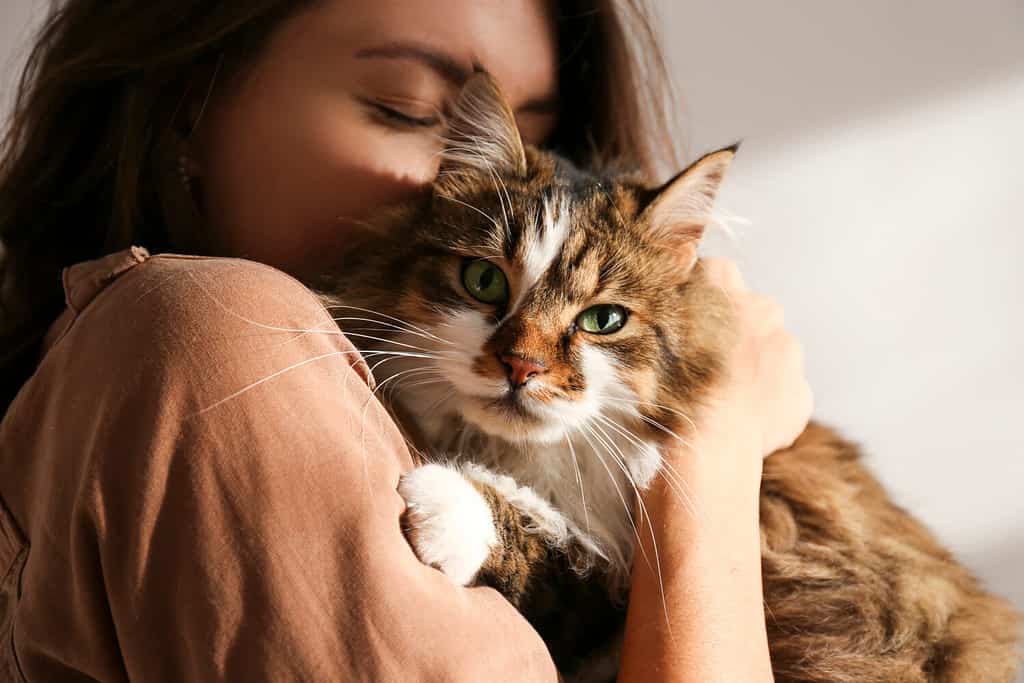
Cats “spray” their urine to attract mates.
©evrymmnt/Shutterstock.com
If your cat is peeing in your bed, a simple reason is that it has not been spayed or neutered yet. Urine “spraying” is seen more in unneutered male cats, but female and neutered cats may spray as well. The reason male cats spray their urine is to attract or communicate with nearby females. While spaying/neutering your cat is the obvious fix, ensuring that your cat feels safe and secure goes a long way toward deterring this behavior.
Another reason your cat may be urinating in your bed is that he wants to mix his scent with yours, to “mark” his territory and stake his place in the community. If this is the case, again, go the extra mile to make sure your cat feels comfortable and confident in his home.
Hopefully, you will soon discover the underlying reason your cat is peeing in your bed and correct the behavior for a happier cat and owner!
Thank you for reading! Have some feedback for us? Contact the AZ Animals editorial team.

